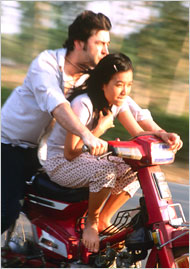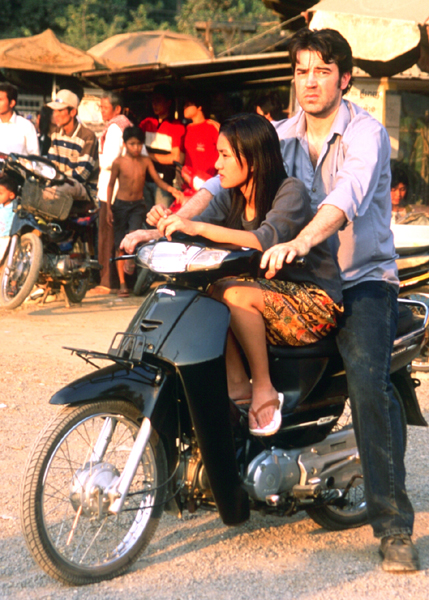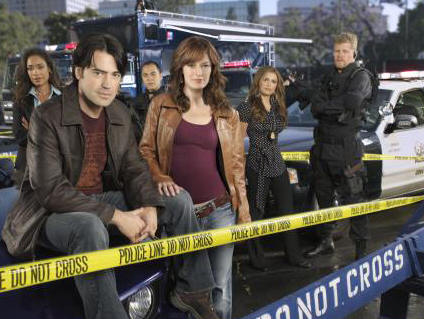Copyright ©2008 PopEntertainment.com. All rights reserved.
Posted:
January 18, 2008.
When I first met Ron
Livingston he was a featured personality at the New York Independent
Television Fest kicking off his Fox TV show, Standoff (he starred as
Matt Flannery, a senior FBI negotiator). He had come to my attention
previously through the film The Cooler but he had been on the map
since he was in the popular hit Swingers in 1996 (which also put into
motion the careers of Vince Vaughn and Jon Favreau and director Doug Liman).
His other notable
acting credits included the Oscar-winning Adaptation, the cult hit
Office Space (he starred opposite Jennifer Aniston), the mini-series
Band of Brothers (and was nominated for a Golden Globe as a result) and
eight episodes of Sex and the City.
Though Livingston
lives in Los Angeles, he did a stint in a very different place, Cambodia, to
star in Holly – a hard-hitting examination of the child sex trade in
Southeast Asia through the eyes of one 12 year-old girl and the American who
becomes her inadvertent protector. Created by a team of Israeli filmmakers,
the indie production was shot in real brothels with actual sex workers as
extras; Livingston endured the heat, strenuous conditions, and various risks
such as imprisonment and intestinal parasites to create an incredibly
authentic performance and live to talk about it.
You've been doing some
heavy films of late,
Holly and Music
Within, which are different for you having made your reputation in a
comedy like Office Space or TV series like Sex in the City.
Was this a conscious decision?
It's just how it
happened. A lot of it is, I think directors look at the last thing you did.
A lot times they come together in clumps. When I was doing comedies, I was
asked to do comedies. When I was doing some more serious work, I was not
asked to do comedies. I think I try to follow my nose, what stories jump out
and appeal to me.
Is this the new Ron
Livingston now?
I don't know. One of
the fun things about being an actor is that you can't do the same thing
twice because the next job I do I'll be a couple of years older; I'm going
to be down the road a bit more. No one's going to hire me to be a
24-year-old anymore. I have to discover what story I can tell now. I don't
know what they want the "new Ron Livingston"
to be.
 What
kind of challenges were there with this film,
Holly?
What
kind of challenges were there with this film,
Holly?
This movie was a
little bit of an experiment for me. I guess the simplest way to describe it
is, when you act – you can act big, or you can act small. And this is one of
the films, over a course of a year, where I tried big for some films, and in
this one I tried to be small just to see what happened. I think it's a movie
that required it. [I played] a guy, Patrick, who is in a foreign land and
sort of spinning his wheels, not really attached to anybody. He's caught up
in his own head, really narcissistic. When I thought of the story for
Patrick, I thought the story was about a guy who was swallowed up in
himself, who then engages in the outside world and realizes he's part of
something bigger. And so it worked really well to let it be small where it
could be small, and find only a couple of moments to make it big.
There's ambivalence to
your character Patrick and why he is doing what he's doing. There's a fine
line as to how you read Patrick.
Yeah, there's a
Lolita parallel in this story. You look at a movie like The
Professional, which I think is a more traditional western telling of
this story – good guys and bad guys. In that movie, I think they made a very
conscious choice of wanting to protect this little girl. But because this
movie is about exploitation of children, and using children for sex, when I
read the script, I sort of felt that it needed to be there. Because it was a
test that Patrick had to pass. So often with child abuse, it happens behind
closed doors. I think a lot of times, the approach is, "Oh he would never.
How could you possibly think?" A lot of times, that hides what's actually
going on. I think there's a scene in the movie, where Holly gets confused
where she's at – between girlhood and womanhood. It was a test that Patrick
needed to pass that he not be confused with where she was at – between
girlhood and womanhood. But it was definitely a test he needed to be put
through.
Did you know anything
about child sex exploitation before this movie?
No [laughs].
But you learned a lot
more in doing this movie?
Yeah. It's everywhere.
Cambodia is special in only that. They can walk up to you there and
proposition you on the streets. Not proposition because little kids want to
have sex with you, but because there's such a flood of white guys that are
there to have sex with kids. We've got child trafficking in the Bronx. We
have sexual abuse of children in all 50 states. It's everywhere. And closing
your eyes to it, and thinking it's a terrible, terrible thing far away, is
what allows it to happen. And so we're all responsible for it, but I don't
mean that in a way of guilt. I mean that in that we all have the
capabilities to not allow it to happen in the hundred yards that surround
us. If we did that, if we make sure it didn't happen within the hundred
yards around us, it would be gone.
 Did
you fear or worry about the dangers of making this film?
Did
you fear or worry about the dangers of making this film?
Yeah, this was tough.
We had about 40 or 50 security police with us, armed with machine guns. The
thing you realize is that they weren't there to keep the people away from us
that might want to stop what we're doing. They were there – if they got the
phone call – to take us in [laughs]. So it was a little bit "flying
in the face" of it. I read some journalist's materials about how danger
doesn't look like danger. You don't know you're going to be killed until you
get killed. I didn't feel like we were in trouble. Cambodia is an amazingly
safe place. I saw 60-year-old men, with stacks and stacks of money, sitting
cross-legged on a blanket, changing currency in the middle of an open
bazaar. Nobody would even think of robbing this person. The reason for this
is – it's mentioned in an article I read about a guy who stole this scooter
but didn't get 400 yards until all the locals tackled the guy and poured
gasoline on him and lit him on fire. So in some ways its a very very safe
place. In some ways, it's not. There are things you can do and there are
things you can't do. During shooting, we weren't sure if what we were doing
was the thing we could do or couldn't do.
How was it on set,
working with children who came from orphanages and such places? Was it
difficult to leave them?
My first concern was
how many children are we going to exploit to make this movie about exploited
children. I sure hope it was under ten. My first concern was the girl who
played Holly. And they did a fantastic job of finding Thuy Nguyen, who is
extraordinary gifted, possessed of that talent of an actor who knows what
the truth is and stubborn enough not to let someone talk her out of playing
it. She had a real empathy for this character and what she went through. The
trick was how do we tell this story that protects her from the experiences
of this girl? As an actor, you want to get inside the head of the character.
But you don't want your 14-year-old girl to get too far into the head of
this girl. Ultimately you have to be creative sometimes in the way you shoot
things so that things happen off-camera. We did a very good job of managing
to do that. We'll ask Thuy in five years and ask what she thinks.
[laughs]
Were there any days
that the subject of the film became overwhelming for you?
The hardest days were
the days when we were doing a scene, they had to shoo the hordes of street
kids from the lunch table, to make sure there was enough food and water for
the crew. One of the things that is hard trying to do a good thing in the
world is when it makes you realize how hard it can be to do a good thing. In
America, we're used to results. If you don't win, you lose. I think part of
the story of this movie is that a good deed attempted is a good deed,
regardless what happens. What happens is not in human hands. What happens
happens on a higher level. We can't fix everything. But that doesn't mean we
should fix nothing. Try to fix something, and then pour yourself a glass of
lemonade and take a seat and enjoy the evening.
How different was that
experience from making
Music Within [the
true story of Richard Pimentel, who returns from Vietnam severely
hearing-impaired so he fights for the rights of Americans with disabilities]
which came out recently?
Music Within
was a little easier. It was funny. There are things in Holly that are
funny and charming. I think what ties them both together; they're both about
people who think of themselves as broken, damaged goods and not worth
anything. In Holly, it's both Holly and Patrick who feel that way. In
Music Within, I think Richard has that experience. Art [Honeyman
played by Michael Sheen] doesn't have that feeling about himself, and I
think ultimately Richard doesn't feel that way about himself. Both of these
characters, at the end, change the way they think of themselves. They feel
that the world they live in is broken, but it can be fixed.
 You
have had an opportunity to explore these deep subjects. How does this
contrast with your TV experiences?
You
have had an opportunity to explore these deep subjects. How does this
contrast with your TV experiences?
Both of these films I
made before I did the television show, Standoff, last year. When I
got back from Holly, I was pretty spent. I had an intestinal parasite
at the end of it. I think I lost fifteen pounds at the end of shooting. The
last week I pretty much couldn't keep anything down except vegetable broth.
During that week we had a whole program of doing the running stuff, the
sprinting stuff. So, I was kind of ready to do something light and fluffy
for awhile, and sit in my nice armchair, go to work making some television
for awhile.
Would you do it again?
The television or the
parasite?
A challenge like
Holly...
In a heartbeat. I
think before I went to Cambodia, I would put out some feelers as to what
they thought of the movie. I don't know how welcome we are there.
Are you going to make
a guest appearance in the
Sex in the City
movie?
I'll be appearing in
the audience, [watching the film]. It'll be nice to see the girls together
again.
Email
us Let us
know what you
think.
Features
Return to the features page.